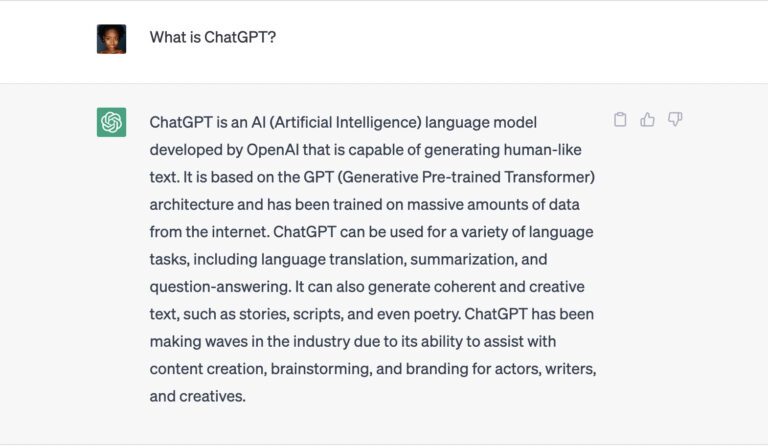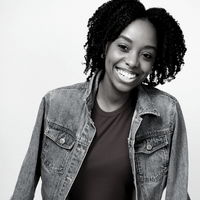
Given the amount of buzz on the internet, by now you must have heard of ChatGPT. What is it? By the system’s own definition (see screenshot below) ChatGPT is “an AI (Artificial Intelligence) language model developed by OpenAI that is capable of generating human-like text.”

The AI language model has made waves in the industry from recent coverage on South Park (Deep Learning, S26 E4), to becoming a hot topic of discussion in the 2023 Writers Guild of America (WGA) contract negotiations (HI – at the time of writing there is a strong prospect of a strike).
While I must confess that I was initially put off by the idea of communicating with AI (due to my own self-proclaimed technophobia and privacy concerns fueled by movies like iRobot and The Terminator), I soon realized that I didn’t actually know the full extent of its capabilities and potential benefits. That was until…I read a newsletter mentioning how to use ChatGPT prompts to speed up and streamline content creation…whaaat? And by coincidence the same day I came across a reposted Instagram story from actress and marketing expert, Jordan Elizabeth Gelber (@jodie_starbaby) who runs the account @actorgpt. Gelber has produced a webinar on how actors can leverage the AI technology to their advantage. She shared, “I was determined to create something using ChatGPT for actors because I saw how many people were creating ‘ChatGPT for this’ and ‘that’ but none of it was directed towards helping creatives with business solutions – and a lightbulb went off.”
The more and more headlines about ChatGPT that came across my newsfeed and email inbox it became apparent I had two choices: either I try it out for myself or risk being left behind as a result of my Capricorn stubbornness. So I gave in and to my surprise, I was extremely impressed and mindblown by the results. As a writer, it felt like I’d stumbled on something forbidden. Detailed responses generated in mere seconds to minutes… gasp blasphemy!
However, like any and all technological advancement, ChatGPT comes with its share of pros and cons…let’s explore.
Pros of ChatGPT for Actors and Creatives
Cons of ChatGPT for Actors and Creatives
In general, ChatGPT shows great promise as a game-changer for actors and creatives, thanks to its ability to enhance creative workflow. However, going forward, I believe it’s important to acknowledge its potential drawbacks and establish clear guidelines in our respective industries to prevent these new technologies from jeopardizing the livelihoods of artists. While it is important to embrace new technologies and find ways to integrate them into our industries we must continue to value the unique skills and contributions of artists and creatives. Stay tuned for my follow-up article where I share insights from artists and creatives on their opinions about AI technology.
6 Must-Listen Podcasts for Actors
Creating Your Safe Audition Space


Vongai (she/her) is an award-winning actor, singer and writer based in New York. She has worked in theatre, film, television and voiceovers. Before the Big Apple, she was born in Harare (Zimbabwe) and raised in London (UK) and Beijing (China) making her a proud third culture kid. She holds a B.A (Hons) in Film and Television Studies from Brunel University London and had the privilege of classically training at the American Academy of Dramatic Arts, NY. In 2018 she won the award for Best Drama Actress at Catalyst Content Festival (formerly ITVFest) for the short film, Patiri In The Promised Land. Vongai hosts ZimExcellence, a podcast that spotlights Zimbabwean change-makers and trailblazers. The show currently has 2.3K+ downloads and has been streamed in 58 countries and 381 cities around the world. Vongai is also a self-proclaimed ‘audition cheerleader’, having garnered over 800 positive reviews for supporting actors with their auditions on the platform, WeAudition. Follow her journey @vongaiofficial | https://bio.link/vongaiofficial
Read Full Profile© 2021 TheatreArtLife. All rights reserved.

Thank you so much for reading, but you have now reached your free article limit for this month.
Our contributors are currently writing more articles for you to enjoy.
To keep reading, all you have to do is become a subscriber and then you can read unlimited articles anytime.
Your investment will help us continue to ignite connections across the globe in live entertainment and build this community for industry professionals.